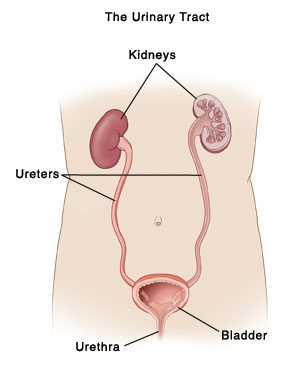Dysuria
Dysuria
Dysuria is pain felt during urination. It is often described as a burning. Learn more about this problem and how it can be treated.
What causes dysuria?
Possible causes include:
Infection with a bacteria or virus such as a urinary tract infection (UTI or a sexually transmitted infection (STI)
Sensitivity or allergy to chemicals such as those found in lotions and other products
Prostate or bladder problems
Radiation therapy to the pelvic area
How is dysuria diagnosed?
Your healthcare provider will examine you. He or she will ask about your symptoms and health. After talking with you and doing a physical exam, your healthcare provider may know what is causing your dysuria. He or she will usually request a sample of your urine. Tests of your urine, or a "urinalysis," are done. A urinalysis may include:
Looking at the urine sample (visual exam)
Checking for substances (chemical exam)
Looking at a small amount under a microscope (microscopic exam)
Some parts of the urinalysis may be done in the provider's office and some in a lab. And, the urine sample may be checked for bacteria and yeast (urine culture). Your healthcare provider will tell you more about these tests if they are needed.
How is dysuria treated?
Treatment depends on the cause. If you have a bacterial infection, you may need antibiotics. You may be given medicines to make it easier for you to urinate and help relieve pain. Your healthcare provider can tell you more about your treatment options. Untreated, symptoms may get worse.
When to call your healthcare provider
Call the healthcare provider right away if you have any of the following:
Fever of 100.4°F (38°C) or higher
No improvement after three days of treatment
Trouble urinating because of pain
New or increased discharge from the vagina or penis
Rash or joint pain
Increased back or abdominal pain
Enlarged painful lymph nodes (lumps) in the groin
Updated:
October 08, 2017
Sources:
Current Medical Diagnosis and Treatment (2013)
Reviewed By:
Brown, Kim, APRN,Greenstein, Marc, DO,Image reviewed by StayWell medical illustration team.
